Everyman Richard Carlson leads a handsome cast in this Gothic thriller made for the Fright Night drive-in market.
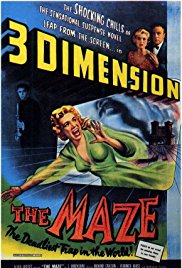
Carlson is dancing the night away to celebrate engagement to Beauty, when he receives a telegram. The news is bad but not that bad. His Scots uncle has died and he is the new baron, required to go to the distant, remote, and forbidding castle…in studio 13 of Roach Pictures. Few who go there, return…to A pictures.
Richard takes leave from his fiancée with many endearments and promises a speedy return after completing the formalities.
Guess what happens next?
The movie opened with a cryptic conversation between Australian Michael Pate and another retainer in the dank, dark castle when his Lairdship cacked it. An air of menace hangs over them. Carlson’s inheritance seems tainted even before new reaches him.
Some days later Beauty gets a letter from Carlson blowing her off, for good, for ever. for good-bye.
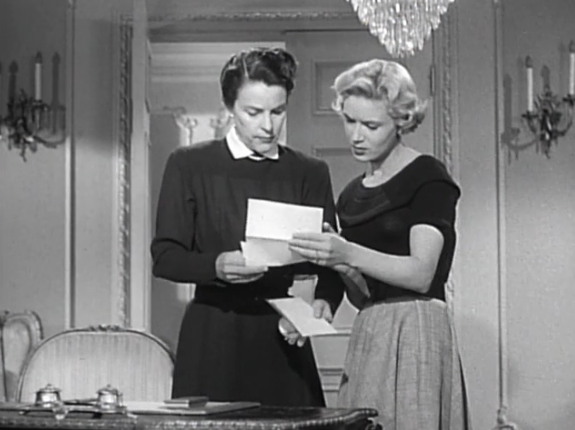
She and her aunt study the letter for its subtleties.
It is a ‘Dear Joan’ letter to end ‘Dean Joan’ letters. It stings but she is one bracing woman and with her aunt in tow sets out to Studio 13, that is, Scotland, to straighten out Richard. Could not quite see why she was so determined to land him, but she is.
It takes some will power to get there, first the Atlantic, and then across the moors (of course), and even more to get into the door of the castle. Michael Pate is one polite but reluctant doorman. Once admitted she meets again her beloved and finds him a changed man.
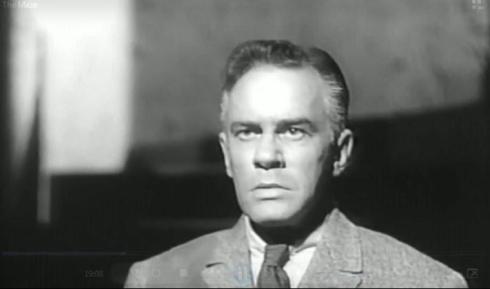
Once young, now old. Once affable, now grim. Once in dinner suits, now in tweeds and argyle socks. Changed. (The fraternity brothers were betting on a kilt.)
Yes, about a pound of make-up has been pasted onto him along with much grey hair spray to age him and make him look haggard, like a man with a credit card debit he cannot pay and a pile of unmarked examination papers waiting for him.
This shock redoubles her determination to get to the bottom of this mess. A sensible woman, her aunt wants to go home. So did I by then. Various hijinks and confrontations follow. To continue the narrative I have to spoil the denouement and I want to, because it is so Abbott and Costello. To ask an audience to suspend disbelief is one thing, this is another.
As Richard explains in the wrap-up at the end, when he arrived at the castle he discovered that his great grandfather was a frog. That was bad. Worse was that frog great gramps still lived, because some frogs are long lived. The slithering in the hallways at night, the midnight splashing in the pond at the middle of eponymous maze, Carlson’s make-up, these all trace back to great gramps, who still runs the place, frog though he be. The succession of Barons, Carlson being the latest, have been fronts for great gramps, tenderly cared for by Michael Pate and his Igor, who runs the show as Frog in Charge. Everyone addresses this frog as ‘Sir.’ Sure. I kept thinking of Elmo.
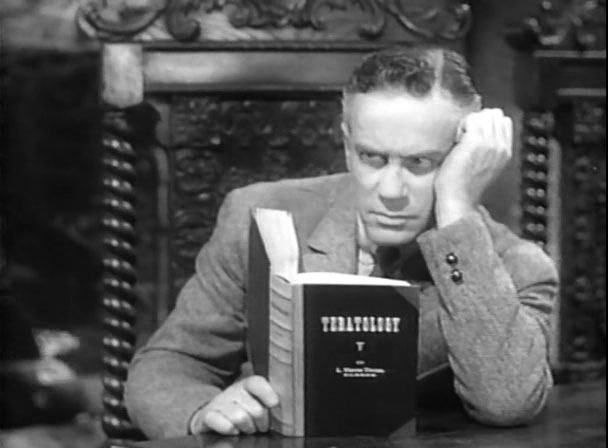
Carlson reading up on teratology in the amphibian section.
The Castle of Otranto atmosphere is thick and entertaining. There are lots of cobwebs. The mystery of Carlson’s transformation is intriguing. The confrontation in the maze is creepy. The players are fine, and the pace is measured. Pate is so ominous no denouement could live up to the foreboding he inspires.
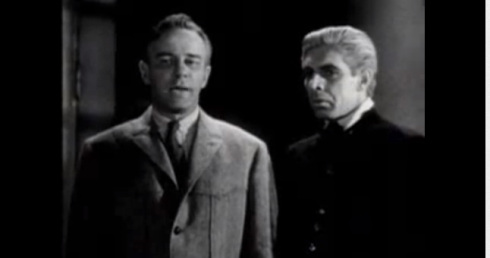
Carlson and Pate trying to look the parts.
In short, the set up and the build up are good, but the result in Act III is a fizzle. Like those storms that crack and whirl and then dissipate with a drop or two of rain. The screenplay had no finish. ‘The Creature from the Black Lagoon’ (1954) or ‘The Fly’ (1958) made more sense.
How uncle combined the mind of laird and the body of a frog is Ed Wood science. Moreover, with that family tree, why would Beauty want to marry Carlson? Newts, efts, and toads to come are there? Or did she trust that her kiss would transform?
The novelty of 3D at the time was such that even this schlock-fest was given the treatment. But 3D never worked in drive-ins anyway.
Category: Film Review
‘Killer Klowns from Space’ (1988)
Who could resist such a title? Not me.
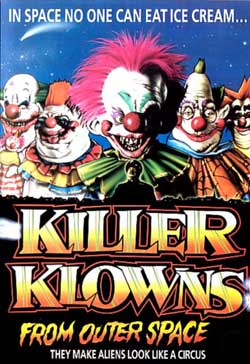
On the IMDB it is described as a comedy. I hoped it would equal, nothing could surpass, ‘Spaced Invaders’ (reviewed elsewhere on this blog). Not so. At first I thought it was a documentary about the Republican Party. Mea culpa.
The set-up is priceless and the execution is consistent, but it is not comedy as we know it. The genre would have to be Horror, sub-species ‘coulrophobia.’ Look it up, Mortimer and be enlightened, for once.
A circus tent complete with an ensemble of grotesque clowns, oops, klowns, lands in Royal Dano’s (who else!) pasture outside Hicksville USA. The Klowns set about harvesting climate change deniers, wrapping them in cotton candy to ferment, and when just right…..
When interrupted by teenagers doing extracurricular biology lessons, the alien klowns call out the dogs. That was a cackle and a half.
There is a phylum of Horror movies where teens discover the evil and try to report it to authorities, who stupidly reject the reports until it is too late. ‘The Blob’ (1958) was the landmark in this category, though not the first and certainly not the last. In this instance authority is played brilliantly by Sheriff John Vernon, and we waited for his comeuppance which came on cue.
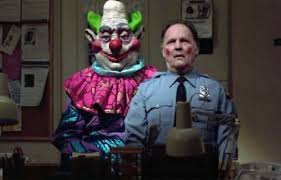 Comeuppance delivered.
Comeuppance delivered.
We also like the shadow play on the wall, and then wooshka!
There is an ice cream truck, lots of red noses, and a Willy Wonka interior of the Tardis space tent.
There is one scene of tension with a little girl and a wooden mallet.
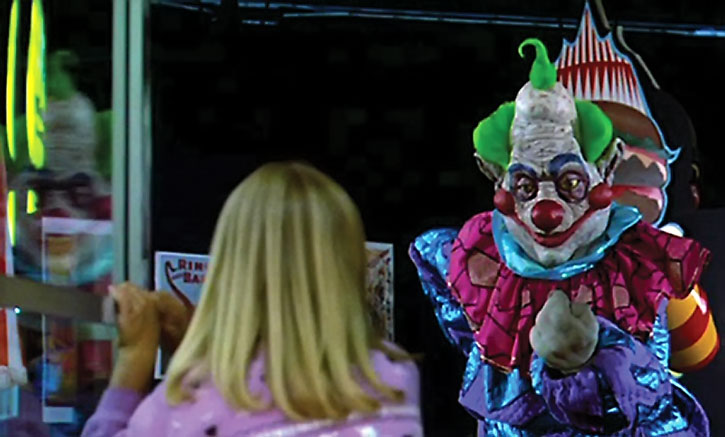
And a long, boring, and pointless scene in a pharmacy.
The Klowns are frustrated by the teens and blast off in their tent spaceship before hundreds of eye witnesses who use alternative facts to explain the destruction left behind. These are people are known as the Klown deniers. But more importantly, what did happen to Royal, his dog, and the others? Who knows. What were the Klowns doing? We’ll never know, until we watch the sequel.
IMDB has it at 6.1, which way to high to me, though I admired the artistry in the effects when it was clear the budget was … well, what budget? The cast, apart from Mr Dano, were unknown to me as no doubt I am to them.
‘Beyond the Time Barrier’ (1960)
A much better movie than its paltry IMDB rating of 5.3 indicates. What I liked was the message that we are destroying ourselves. Who needs aliens when we are so good at it. I also liked the integrated set design and the ambiguous ending. Altogether it is more thoughtful and well realised than the score which puts it a mere 0.2 points ahead of the turgid and indigestible lump that is the big budget ‘Saturn 3’ (1980) at 5.1 with its all star cast.
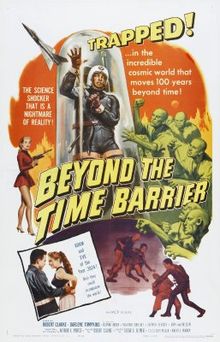
Lobby card.
Chuck Yeager had the day off and in 1960 test pilot Robert Clarke (remember him from ‘The Hideous Sun Demon’ [1959], probably not under all that make-up of sun skin cancers) flies his X-Plane into the year 2024. High octane, indeed! Whoops!
He seems to land back at the airbase he left, unaware of the elapsed time and finds it an abandoned ruin. Empty. Spooky. Eerie. Nice. There is no one and nothing among the ruins. Not even a calendar. Little does he realise he is beyond the Time Barrier! (Most airlines charge extra for that.)
He heads toward a distant light, wearing his flight suit and helmet. He does that a lot. Not the most comfortable of gear, but it does make him stand out.
He stumbles on to an underground civilisation where, after assaulting the first natives he meets, as per his survival training, he is perceived to be an enemy, a spy, a threat. Dunno why. I suppose the flight gear partly explains that reaction but it is not made explicit. He is imprisoned and in time finds there are three other prisoners, Russians who, thanks to the miracle of Hollywood, speak perfect English. Russians. 1960. Oh oh.
There follows much Geordie-speak about the time barrier. Oh hum. When they show him the current Dilbert desk calendar Clarke finally gets it: 2024. (He goes all able when he thinks of how many IRS returns he has missed!) While these four realise they are time travellers, the Mole people do not believe such a thing is possible and deny reality. Now who does that remind me of….
The four scapes decide to use Clarke’s plane to go back in time to warn humanity of the plague and so prevent its occurrence. ‘Scapes’ are those who escaped the plague. (What a struggle to quell automatic correction to ‘scares.’)
Plague? Yes, as one of the Moles explains to Clarke, the accumulated pollution of earlier times had depleted the ozone layer and harmful radiation bombarded the Earth in 1994 creating a plague. There were three results: most people died, others mutated into beasts called GOP, and a few fled underground but are now sterile moles.
To review, class, the dead are gone. Forget ’em.
The mutant beasts roam around the surface making it unsafe for the Moles, though Clarke encountered no beasts on his wanderings thanks to the low budget for wandering beasts. When we see some of these beasts in The Pit where Clarke is briefly incarcerated they are straight out of a Weimar expressionist horror movies like ‘Nosferatu’ (1922), white as Dracula, bulbous shaved heads, and slavering creatures. Yuck. They are certainly Republicans. We never see any of their brethren or sistren in the out of doors, nor is there ever any explanation of why these several have been imprisoned in The Pit except as a forthcoming plot device.
The Moles are a classy lot with swanky gear and funky art deco furniture but their kind is dying from sterility caused by the plague. Only Eve is not sterile and from the get-go she fancies Clarke as her Adam. Must be the sexy flight pressure suit codpiece. Ahem. He is slow on the uptake and who can blame him since Eve says not a word, giving him the silent treatment. She is a deaf mute but the Mole scientists are sure she is not sterile. And ready for …. Uh huh, but how do they know that?
She communicates by sign language. ‘One is for….’ She is also a telepath who reads minds and finds that Clarke is harmless and protects him with vigorous sign language like a third base coach on speed.
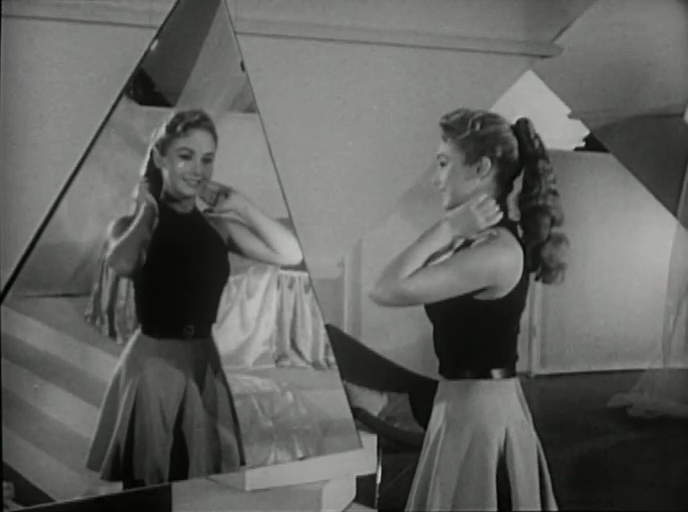
Triangle on the wall, who is the fairest empath of all?
A silent role is not a good foundation for a Hollywood career and she has few other credits and some are hard to forgive, like ‘The Dukes of Hazard.’
There is also one reference to other survivors but that is left a loose end for those of us who were paying attention.
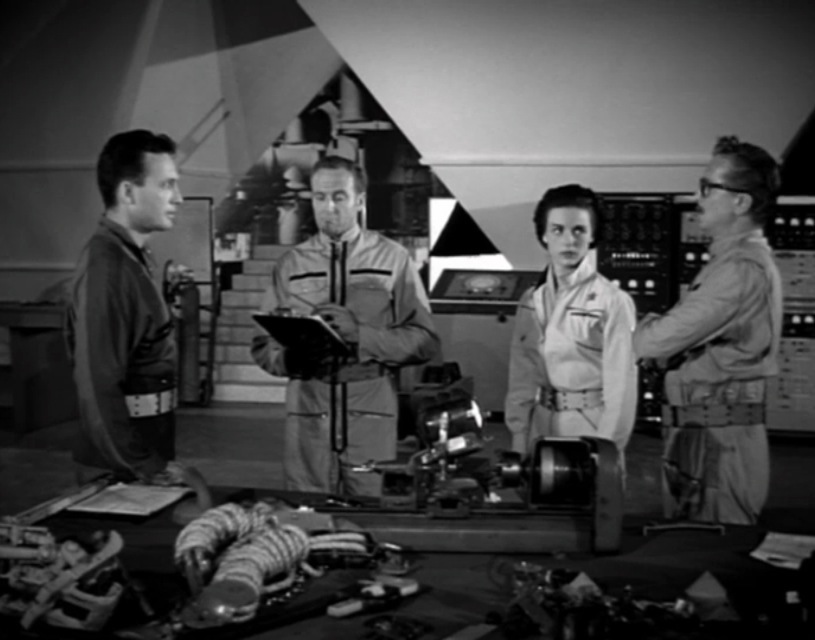
Clarke and the Russians hatch a plan. However, well, it is 1960 and the Russians are not to be trusted now are they.
Still, Clarke, a changed man, is intrepid and makes it back to 1960 to warn the climate change deniers, the anti-vaxxers, and the Tweet-in-Chief of the coming plague. Yeah, right, that’ll do a lot of good.
Edgar Ulmer (he of ‘The Man from Planet X‘ reviewed elsewhere on this blog) was the director and once again he showed Roger Corman how to do a lot with a little.
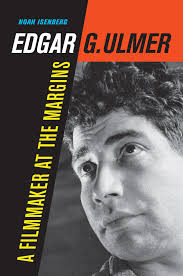
It was filmed in five days funded from the tip jar. The set design of triangles is brilliant and consistently carried through in the camera dissolves and fades.
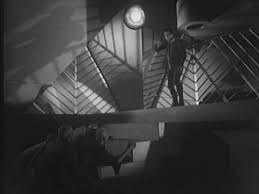
There are also automatic doors, and sometimes the triangles are askew, giving the effect of a world gone Escher.
Some of the comments among the self-appointed reviewers are a cackle. One shouts ‘time travel does not work like that!’ Evidently there are daughters among us those who know how time travel works. Keep that in mind.
‘They Came from Beyond Space’ (1967)
A late entry in British 1950s science fiction on a par with Gerry Anderson productions. (Mortimer, you either get or you don’t.)
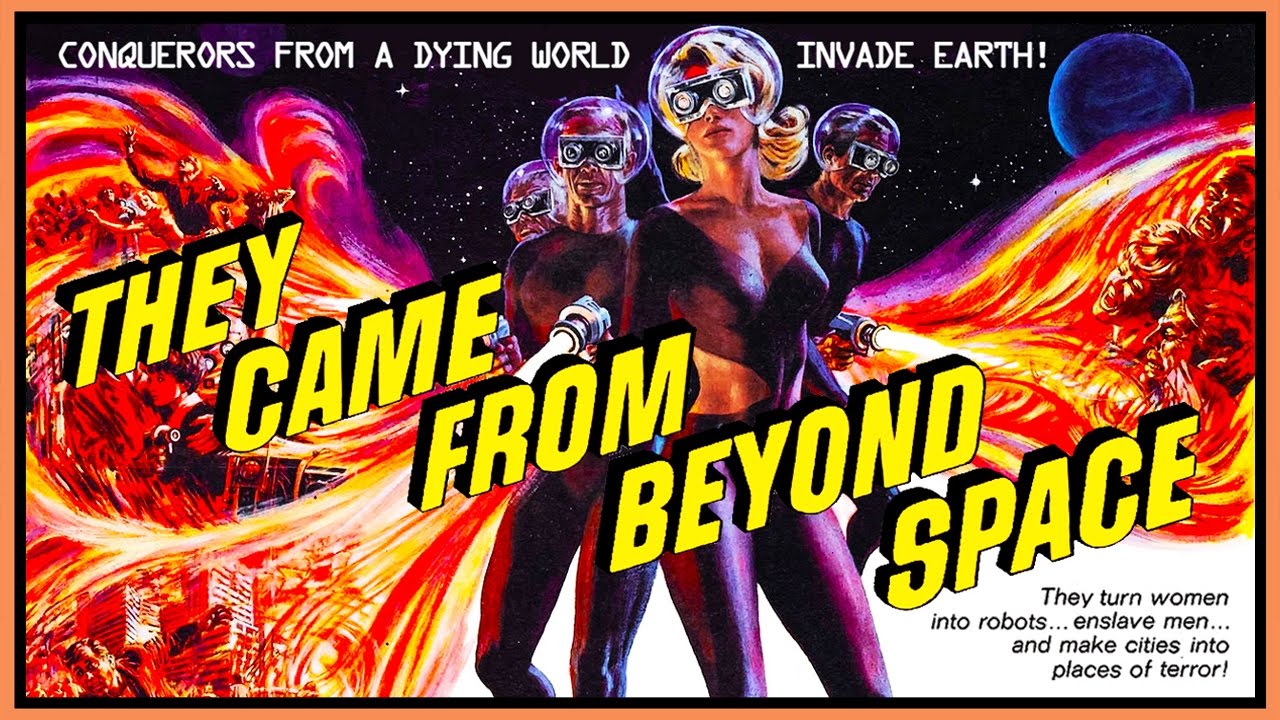
A misleading lobby card.
Meteors land all in a row in a Sussex field and bright lights take over the minds of the scientists sent to investigate. Only the Top Scientist is immune, because he is numbskull.
Spoiler! The Anti-Vaxxers are right! Colanders with tin foil do offer protection.
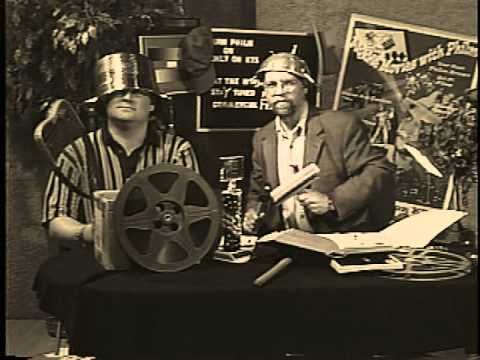
These guys are ready for ‘They Came from Beyond Space.’
The Top Scientist finds that his squeeze now rejects him. She must be possessed by an alien. What other explanation could there be, Erich?
Top is multi-skilled in marksmanship, judo, lock picking, all skills the essential for a PhD in astrophysics. He can also talk opponents to death in the best seminar manner. He is a boring James Bond with a nary a twinkle. He, unlike Bond, is not in on the joke.
He has resisted the mind control of the alien meteors because of the tin plate in his head, the result of too much McKinsey speak at the university with the research manager so off to the kitchen for colanders. Thus equipped he and his elite unit tackle the aliens’ HQ on the Moon.
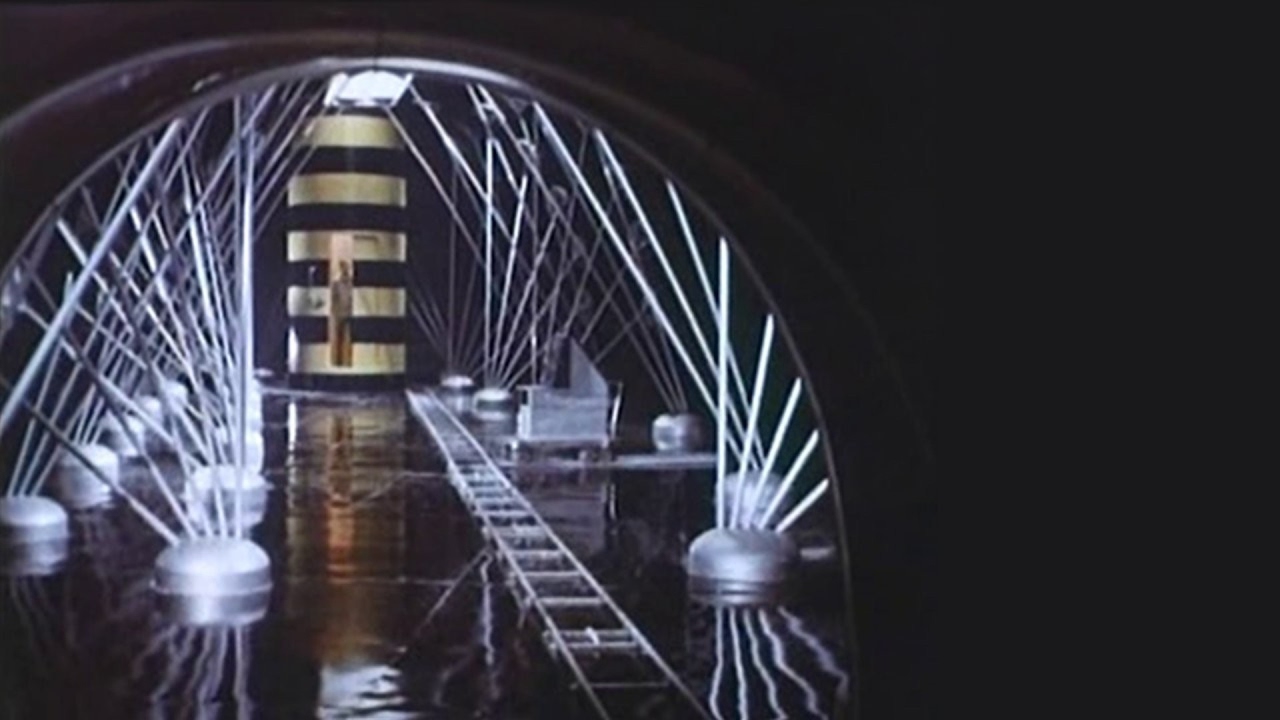
The Moonies hangout.
The Moonies have been alien-napping hordes of rustics, who are never missed, to toil at a Big Dig on the Moon. Top and team liberate them and then they — the freed rustics — spontaneously overthrow the Moonies in their lair.
As if.
Once under the tin hats, the rustic toilers would probably turn on their liberators and blame them for not getting there sooner, for letting them be alien-napped in the first place, file for compensation, whine about Toto, argue with each other about whose feelings were hurt the most, reject the tin hats as not eco-friendly or stylish, go on strike for better conditions before rebelling, and so on.
Why fight enemies when fighting friends is so much easier.
At the denouement the Master of the Moon, Michael Gough in a Carnaby Street robe, explains his innocent motives to Top who then graciously agrees to help. Huh? All the fisticuffs, shoot ‘em up, slavery, and mayhem, and yet they shake on the deal.
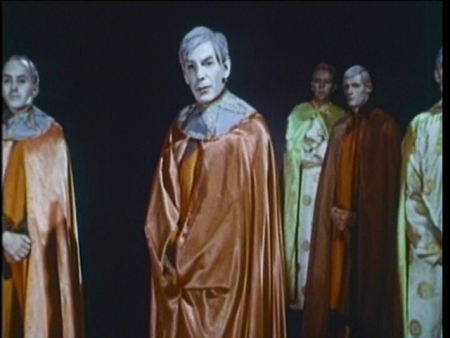
‘Groovy robe, man.’
Did Bond make a sweetheart deal with Dr No? No way!
Can anyone come from Beyond Space anyway? That threw me. Beyond Space, where is that? The Moon? New Jersey?
Much of earlier science fiction used the threat of aliens directly or indirectly as a metaphor for the Cold War, communism, and brain-washing as illustrated here. Hence the proliferation of colanders in the 1950s in Middle America. On the whole the production is lifeless. I did not care if the hot rocks zapped them all. No loss.
It is a common motif in sci-fi that the aliens are vastly superior to us primitive Earthlings, yet somehow the puny Earthlings overcome the aliens. Because of their superiority the aliens are able to come to Earth while weak humans remain planet-bound. The aliens’ superiority is usually shown in technology, but mental powers are also invoked, and in some cases there is moral superiority – think of those that are Greener-than-thou (and everyone else).
Yet somehow the runts of the galactic litter that is humanity overcome these leaders of the pack. Often doing so involves judo. Using the strength of the aliens against them. In Captain Kirk’s case it all too often involved talking them to death.
It is also a common motif that the aliens have come to Earth for real estate because they have mucked up their home world by listening to the climate-change deniers. In other cases they come for other resources, including US!
‘Rocketship X-M’ (1950)
A crew of five sets off for the Moon but takes a wrong turn and hits Mars instead. So much for fancy integrated Solar Positioning System of navigation in the new rocket. The film combines very little technology with some striking photography, and the slow and fast death of one and all, and a message. In ground control is that eternal Sy Fyian Morris Ankrum who tries to make it upbeat in the end. He fails.
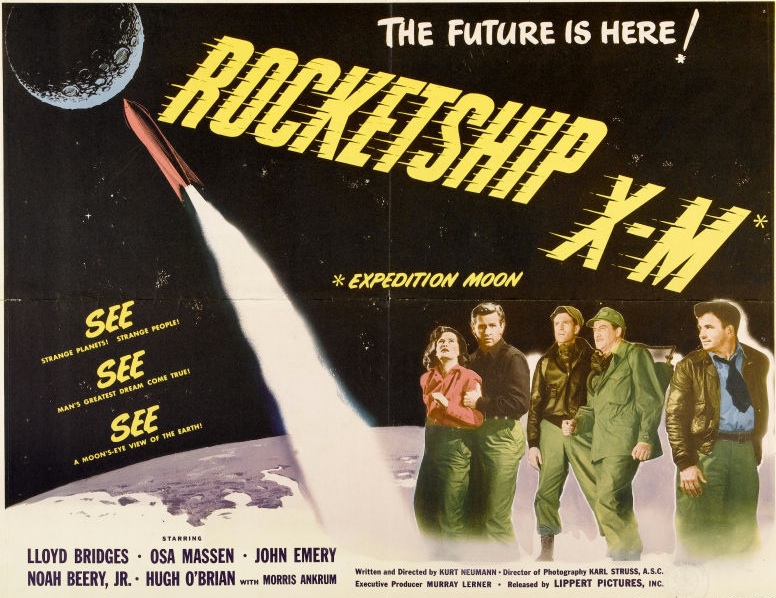
Lobby card.
For the first time, say the know-it-all web sites, a movie shows a multi-stage rocket. Indeed Dr Egghead, leader of the eXpedition to the Moon (hence X-M) explains this to the assembled media, who are sworn to secrecy. (These are the same hacks who a few years earlier published details about US depth charge tactics in the Pacific Ocean in newspapers. Guess what. The Japanese kept up their subscriptions and in turn changed their own tactics. Loose newsprint sank a good number of ships. The Newseum in D.C. strangely does not feature this episode in its trumpeting of the free press.)
That verisimilitude is quickly lost when the intrepid crew undergoes rigorous physical examinations fifteen minutes before launch. Blood pressure tests are administered: Readings are elevated as is to be expected. End of physical. They are also wearing buttoned collars and neckties like RAF pilots.
In addition to Egghead, there is Hotshot pilot, moody Stargazer, and Comic Relief. Wait, that is only four. Who is the fifth? The frail. A lady scientist. Egghead says her discoveries made the propulsion system of the rocket possible. Atta girl! However, thereafter she serves as the object of Hotshot’s lust, Egghead’s condescension, and Comic Relief’s efforts at humour. Star Gazer has eyes only for the stars. Though in one brief aside it seems her calculations of fuel use were right and Egghead’s were wrong. He is not big about it.
Off they go. Vroom! Things go wrong. That is what happens with the low bid contractors. They miss the Moon. Yes, They miss the Moon and find themselves Lost in Space, closer to Mars than anything else. They talk. The talk some more. [I left the room.] They are still talking. Finally they head for Mars and land. Well, why not. ‘M’ works for Mars, too.
Sidebar: They may have gone to Mars to avoid unpleasant comments about plagiarising the story ‘Destination Moon’ (1950). The same is said of ‘Flight to Mars’ (1950) by the know-it-alls.
On Mars the washed out rust coloured photography as they traipse around in mechanic’s coveralls and war surplus respirators is very striking. (It was filmed in the Mojave Desert.)
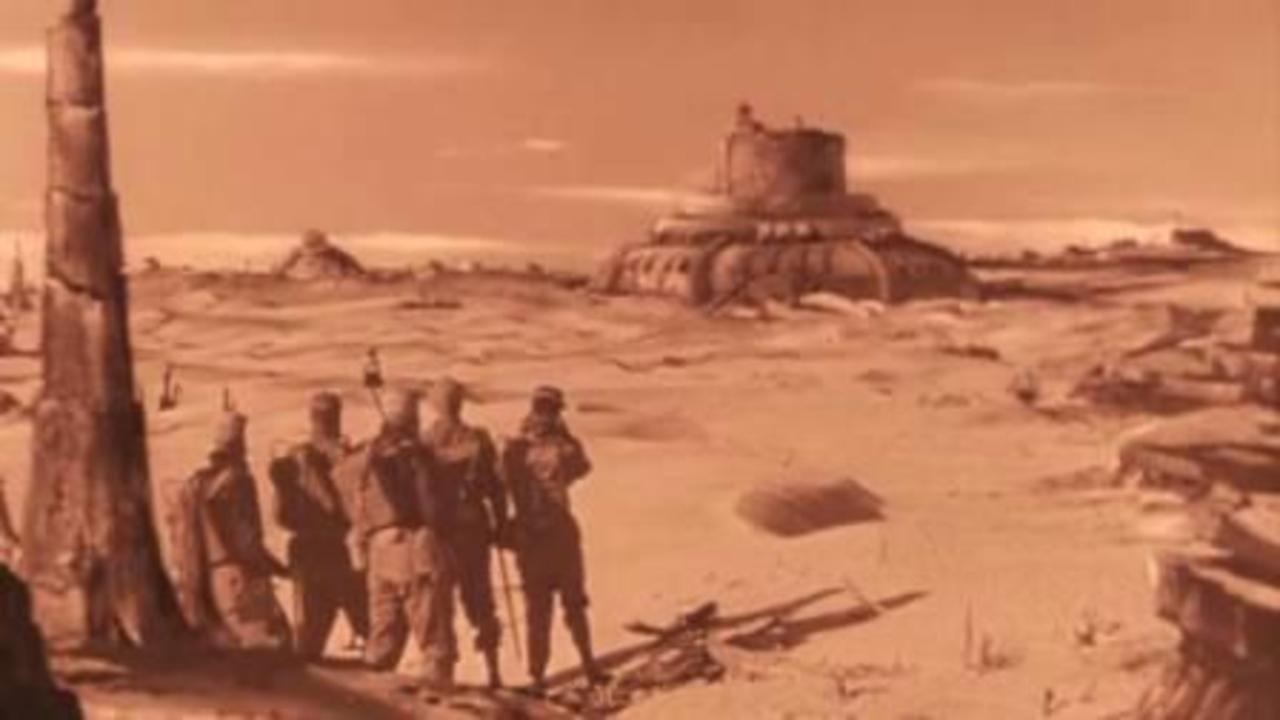
Red Mars.
The awe and wonder of the red planet comes across, accompanied by some muted theremin music, an essential for quality Sy Fy. More of the silent majesty of a new world would have been nice.
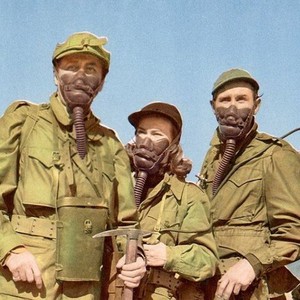
Note the gear for Martian exploration.
But by this time they are running out of B movie time, and ideas. Albeit, the direction does not feel rushed.
There is movement in the distance among the russet rocks. Natives. Martians who look like injured wrestlers from WWE, limping around with shaved heads, hairy backs, lantern jaws, tiny frontal lobes, big biceps, lots of scars and bruises. The crew stumbles on a sunbathing Martian woman, who does not look anything like something from WWE, and she sets off the alarm with a Hammer horror film scream. Wow! She is blind for reasons to be explained later. Read on.
The cavemen from WWE arrive bearing rocks and hurl them at the crew who conveniently remain within range below the cliff faces. Comic Relief goes first, as we knew he must. He was, by the way, Noah Beery, Junior, who was as ever charming and likeable, if tiresomely predictable. Egghead cracks next. Hmm, these are the best of the best the United States had, sent into space, and they are beaten and battered to death by cavemen. Maybe the physical should have been more rigorous.
The surviving crew shows surprisingly good sense in abandoning these fallen comrades and rush back to the ship and blast off. They have dragged along the square jawed Stargazer who also got clobbered, and is a burden. For some reason the two survivors did not consider lighting the load by jettisoning him. I did, maybe because he is the impossibly handsome Hugh O’Brian. That latter fact might explain both his retention as well as my suggestion to dump him.
Now the Lady Scientist and Hotshot alone together are rocketing back to Earth. She does more calculations with her slide-rule. This is one calculating gal. They have not the fuel for a controlled re-entry! She was indeed right about that as above. Crispy critters are on the menu. Gulp.
But first they have to warn Morris back in control of the dire fate that befell the Martians in the sure and certain hope it can be avoided. Huh?
It seems they made a lot of inferences from their two-minute first and last contact with the Martians, some radiation readings, and an fabricated icon in the red dust. Mars had an advanced civilisation (Exhibit A, the icon) that destroyed itself in a nuclear holocaust (Exhibit B, the geiger counter clicking) and has reverted to the mutant primitives they encountered (Exhibit C, hairy and blind) who walloped them. What other explanation could there be, Erich?
Is this a composition error? They met one blind woman and a few hairy-backs and have concluded all Martians are blind or hairy. Come to Newtown on a Saturday night and meet the local animal life and from that generalise to us all. Gosh, I hope not.
Hotshot and Lady Scientist in a broken transmission to Morris Ankrum back home pass the word: Don’t blow yourselves up! Message received. (Blow up others.) They then plunge to a fiery death while in a fiery embrace. Morris, like some surgeons, declares the operation a success though the careless patients died.
Oracle IMDB weighs at 4.9 opinioniums. That is below some of the effluvia of Adam Sandler.
But wait, there is a serious message buried in the melodrama as Hotshot and Lady Scientist clinch in the barbecue.
Atomic radiation is deadly, long-lasting, unavoidable, and even worse than Faux News. (Yes, that is possible.)
In many Sy Fy films of the era the official line of the US Atomic Energy Commission was followed according to which radiation was a minor nuisance. Wear gloves. Take aspirin. Say the Pledge of Allegiance. No problem. The films from this era are too numerous to list where atomic power is used like overproof diesel to power lawn mowers. It is no solace to know that the same thing happened in the Soviet Union, another example of convergence.
In the early 1950s concern about radiation in the United States was widely disparaged as a communist disinformation plot to inhibit the development of righteous American nuclear weapons and power. If a scientist published data about the ill effects of radiation, it was denounced as Red propaganda by the HUAC and Tail Gunner Joe. These were the climate change deniers of the day. Scientific evidence was dismissed toute suite! Alternative facts were manufactured.
In that context the screenplay’s emphasis on the evil of radiation was a show-stopper. In fact, the screenplay does have a moral within the Tom Swift adventure and the melodrama of the doomed lovers, and that is the evil of nuclear weapons. Subtle huh?
Not subtle enough because the screen writer fell to the HUAC lynch mob for his trouble and spent time in the slammer as a red incubus. That was the very talented and much accomplished Dalton Trumbo, who lives in my affection as the author of ‘The Happy Jack Fish Hatchery Letters.’ All of this cryptic to someone who wasn’t even born then: Tough.
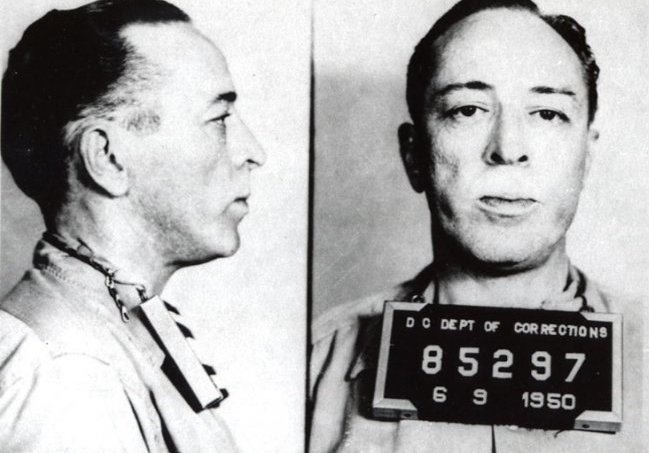
Dalton Trumbo on the way to the slammer.
By the way, 1950 was the very year the lynch mob turned on Robert Oppenheimer, whose leadership led to the atomic bomb, but who had many qualms about nuclear energy, nuclear power, and nuclear weapons. Red qualms said HUAC. What other explanation could there be, Erich?
Morris Ankrum must have had a deal according to which he had to be in in every Sy Fy pot boiler. My man-crush on him is explained in another post. Search for it and be enlightened.
Personal note. I did a brilliant grade school project on Atoms for Peace based on the Atomic Energy Commission’s publicity when I was a cute little boy. It set me on the way for the great career I had in Physics lab in college. Little did I know.
Second personal note. Learning to use a slide-rule was a major accomplishment and I still have it in my desk. (Though I have completely forgotten how to use it.)
‘Not of this Earth’ (1957)
Here is a set-up: A mysterious alien in a black business suit with a briefcase comes to Earth to subdue the Earthlings and harvest their blood. A boring Organisation Man, he carries in the briefcase a McKinsey Management Manual and uses it to condemn the hapless Terrans to endless meetings where the blood drains to the sitting position while they try to out-cliché each other with key performance indicators! Everyone’s job to manage something, but no one does anything. Get it? The aliens take over and no one notices.
Good, huh?! The idea is for sale. Every one has a price, and mine is cheap.
‘Not of this Earth’ is a Roger Corman production and surprisingly low key for this auteur. Paul Birch is the man from planet Davanna in a black suit with dark glasses and a stony expression who is lonely in a crowd. Well. no expression at all and a dry as dust delivery.

How does Birch collect blood? Well, don’t knock on his door and then follow him to the basement. Do not accept an invitation to dinner either. Glug, glug. The story is cryptic but it seems more than a dozen victims have littered the streets, unnoticed by the carrion of the press, each drained of blood. The word ‘vampire’ is mentioned once in connection with puncture wounds found on these victims. Ssssh.
That might sound like a big deal, what with a dozen dead young women lying about, but in the cop shop it is business as usual. Much sitting around eating donuts and complaining about the station coffee is done.
Birch does some analysis in the basement with the chem set from the brief case. Glug, glug. Looks like the Davanans can use human blood, so he opens the closest in his bedroom and teleports thirty cubits of blood to Davanna. (Yes, ‘cubits.’ To find out what the length of a forearm has to do with blood ask Roger Corman.) He also tries to teleport a living specimen, but this specimen arrives compressed. That is best left to the imagination. Bones was right not to trust beaming.
Birch himself is none too healthy and visits a doctor early in the going. With telepathy Birch exercises some mental control over the physician. To keep his strength up for blood-collecting Birch hires a nurse to live in his house and administer blood transfusions each night from some identified source of blood. She is Beverly Garland, who had a career in television with hundreds of credits. Can she handle this blood sucker!
Birch goes to libraries and bookstores to research humanity with special reference to matters sanguinary. He is socially inept and cannot drive a car. Odd for a man of his years in that time and place.
Then in a marvellous scene he passes a woman on the street and then stops to look in a shop window.
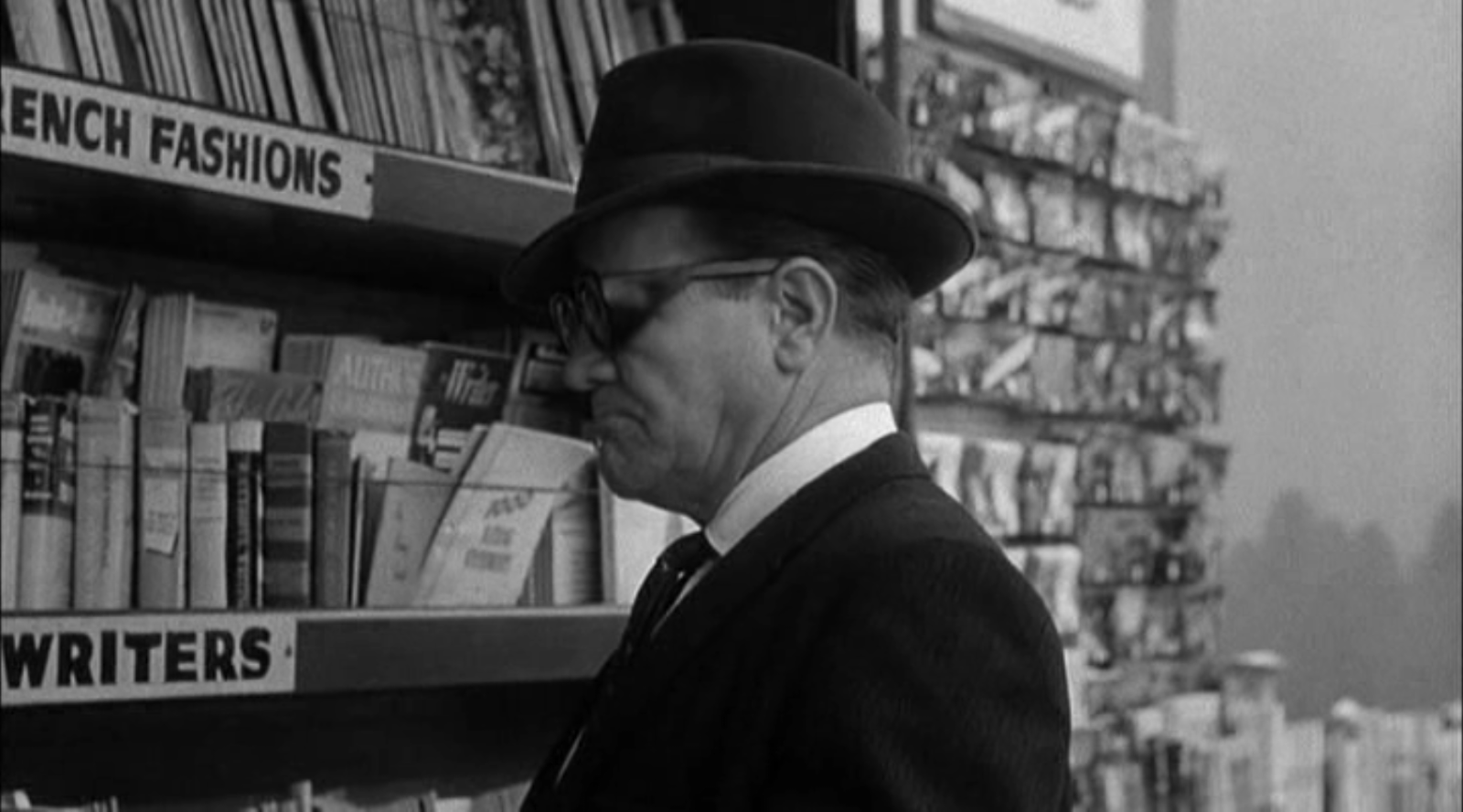
Alien window shopping for the latest Earth fashions.
She catches up with him and stops next to him, and they stare silently into the window, communicating by telepathy with voice overs. She, it turns out, is another Davannan whom he knows and she has come through the teleport in his closet, without asking permission, so desperate are things getting back home. Her account is cryptic. Some reviewers think she is describing a nuclear war on Davanna. I thought it sounded more like the destruction of a Republican Congress.
That is very like the enigmatic account in ‘Alphaville.’ Lemmy drove his Ford Galaxy across intersidereal space to Alphaville to talk the boss computer to death, while smoking forty a day. We are never quite sure why. Just seemed like the thing to do. Jim Kirk watched this as a lad and got his line in talking computers to death from it.
The situation on Davanna is desperate, and this Davannan woman herself is near death. This grim news and her perilous state drives Birch to act in haste (and repent at leisure). By now his cover is blown. The nurse knows something is up, and she no longer trusts the evasive doctor who seems to be part of it, so she rats them all out to the cops.
Birch realises she is onto him and asks her ever so politely and dryly to stand still while he dispatches her. Yikes! She does not comply.
Loved the scene when she calls the police with a perfectly clear demand for help, and let us remember all of those earlier victims, because the cops seem to have forgotten them, while the male officer on the phone dismisses her as an hysterical woman! So stupid, so annoying, so credible.
Birch has an Achilles ear and Beverly figures out how to deal with him. Stunned, weakened, confused, under a great deal of pressure, and an inexperienced driver, Birch rams his big Buick into a wall and dies.
The end! The end. The end?
Not quite. As the final credits roll, another man in a black suit with a brief case wearing dark glasses and a dead face strides across the grass toward the camera. Nice. Looks like Davanna has sent in Lemmy II.
The film opened with a scene before the credits, a rarity in 1957, in which the stone-faced Birch behind the dark glasses recites his collection of blood. Unusual and ominous.
The film is well paced, and low key. The music score matches the action, which is not always the case in this genre. The direction is deft and the pace is pacy.
Birch is sometimes called the poverty row John Wayne. He is perfect here, though he does not have the flat delivery the Duke could produce. Birch, too, had a long career in television. The rumour mill has it that Birch and Corman had a mighty argument about something, and Birch quit, leaving Corman to hire another actor to fill-in for him in distance shots. Since much the film takes place the dark, he is after all a vampire in all but fangs, who can tell.
When the doctor recovers his wits and tries to report to the police his conclusion that Birch is
‘Not of this Earth,’ Birch conjures a floating octopus that flies through the air and envelopes the doctor’s head like a feral lamp shade. The doctor is no longer of this Earth.
If Birch had flying octopi in reserve why did he not make more use of them? I would.
That creature is utterly gratuitous. Did the marketing department want a creature to feature on the posters and magazine advertisements, and did Corman oblige with this lamp shade which is but a sidebar. It may have also padded the movie when Birch quit or maybe he quit because of it.
On the IMDB is rates a respectable 6.4, though that puts it on the same level as the execrable Adam Sandler movies.
‘Destination Moon’ (1950)
A deuce documentary approach to the first flight to the moon, and back from producer George Pal, who went to great lengths, consulting Willy Ley, to get the science right, as it was then understood, and to get a major studio to release it for an A movie audience. He succeeded with the former but not the latter. The film was so eagerly anticipated that it spawned several quickies to ride the coattails of its publicity. e.g., ‘Flight to Mars’ (1950) and ‘Rocket X M’ (1950) and others.
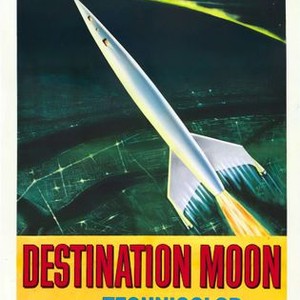
Lobby card
Space flight in 1950 was kid stuff, Buck Rogers, Captain Z-ro, Space Cadets, Flash Gordon, and Rocky Rocket, not for adults. The ‘New York Times’ reviewer, Bosley Crowther (1905-1981), agreed in a condescending, snide, and asinine review at the time. Crowther offered his own scientific advice, according to which space flight was i m p o s s i b l e. Period. He explained that the acceleration necessary to leave the Earth’s gravity could not be achieved. Never. Crowther also garbled the concept of ‘free orbit.’ No doubt he would be an Anti-Vaxxer climate denier today with that grasp of physics. Good thing he did not have to review ‘Fantasia’ (1940).
The film follows the preparation, launch, landing, and return of four astronauts from the United States in the hard Korean winter of the Cold War. The word ‘astronaut’ is not used, rather they are spacemen. There are obstacles aplenty. Test rockets that check out perfectly then fail on launch. How can that be? Sabotage by ‘them.’ Get it? The Reds left the beds and are now under the launch pads.
Indeed ‘they’ have infiltrated the government so that it cannot develop the moon missiles. Sounds like the party line from the House Un-American Activities Committee via the typewriter of Robert Heinlein whose story is the root of this film.
Yet it is imperative to get to the moon to prevent ‘them’ from getting there and using it as a missile platform. Something that ‘we’ would never do.
It is up to all those defence contractors to build the rocket. One of their number convenes a meeting and puts the proposal. Time to put up or shut up! After some hemming and hawing they agree. (As if!) A good thing, because if they did not, then no movie and no paycheque for Heinlein.
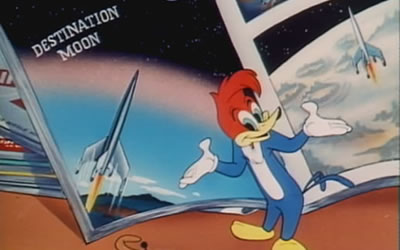
Woody explains space flight to the magnates.
Four aged men, none of them a pilot, one a general who evidently is free to roam the cosmos, two technicians who developed the engine, and the red shirt comic relief are the elite crew. In contrast to many other genre films of the time, there is no woman on board to be the butt of stupid remarks. In this outing the stupid remarks come from the comic relief. His naive and querulous remarks allow the three smartypantses to explain the science of moon flight to him. Also absent are tensions among the crew whose members work well together. Space flight is difficult enough, leaving no time for bickering and acrimony and that makes a refreshing change of clichés.
The gravitational force on takeoff, weightlessness, space sickness, free orbit, the starry cosmos. extra-vehicular activity are all there, and well done. The desolate moonscape is very nicely done, though the cracks on the studio floor imply it was once wet like a dry river bed. Hmm.
There are moments of drama during the EVA (see above, Mortimer). The landing is rough and consumes a great deal of fuel, compromising the return flight. Before facing that, the scientists in bright coloured, high visibility space suits claim the moon for the United States. oh, and all mankind. That’ll fix ‘them.’ ‘They’ would not dare set foot up there now!
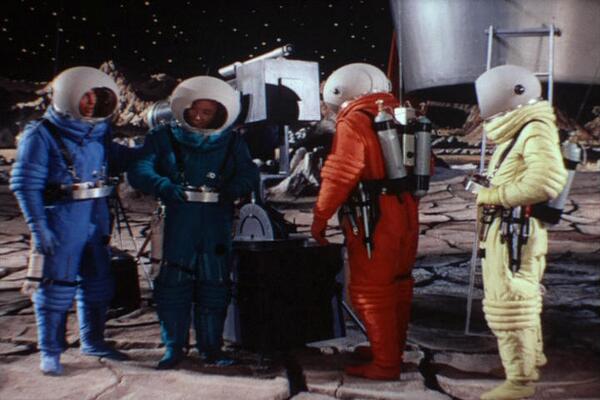
High visibility space suits, which were later re-used in other films. Check out the floor cracks.
At the approach of the launch window for the return flight the crew must shed weight from the ship. A lot. More. Yes, as predicted, though they rip out just about all the props there is still too much weight. By coincidence the excess weight matches that of the red shirt comic relief. Gulp!
The three big brains sit around trying to out noble each other by volunteering to stay behind for certain death. The industrialist, the AWOL general, and the engineer with the deep voice compete in declaring themselves useless. [Pause.] While they are listening to themselves, it’s a no-brainer and the comic relief jumps ship to sacrifice himself. ‘Good,’ I said, ‘no more stupid questions.’ But ‘we’ do not leave anyone behind (as ‘they’ would, is implied.)
But wait, at that moment the industrialist sees a way to shed more weight, and it is an ingenious idea, and can only work if the comic relief returns, which he does.
Whew! The four of them make it back to a return of heroes. A few bold individuals can do what the government cannot. Was this Ayn Rand’s favourite movie? ‘The End … of the beginning,’ says the closing title. Six years later Sputnik went beep beep in Bosley Crowther’s ear. George Pal was way ahead of the curve unlike the ‘New York Times’ reviewer whose mea culpa could not be found on the interweb.
Pal could not convince a major studio to make the film so he created a shelf-company and did it himself as an independent production. The can-do spirit of private enterprise did not apply to the big studios. He did negotiate release through Allied Artists.
‘The Man from Planet X’ (1951)
On a remote, fogbound Hibernian island in the far Outer Hebrides beyond the end of the line an astronomer sets up a small private observatory in a conveniently abandoned castle with his bright and beautiful daughter along with his assistant Igor.
Why?
The locals find Prof avuncular and his daughter comely, but still a puzzle. This Scottish island was in Studio 13 on Poverty Row, i.e., Monogram Pictures.
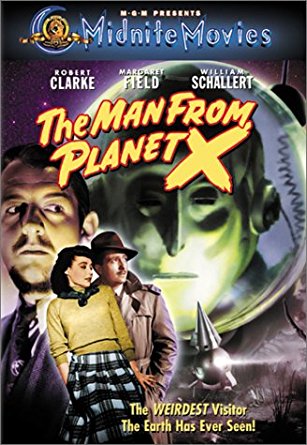 Lobby poster
Lobby poster
Fredrick Ulmer, the director, grew up on German expressionist films before fleeing the new regime in 1933, and it shows in his many American films. The set is dark; it is foggy; it is misty; it is ominous in silence; it closed in and stifling; nothing is quite in focus. Ulmer did much himself, from painting the backdrops to manhandling the camera, and the editing.
The professor went to the island because Planet X has come swooping into the Solar System and is headed for a near miss with Earth. The island is the point on Earth closest to the passing Planet X from whence the Prof will train his telescope onto it. So much for science.
Then in the island gloaming there are flashes of lightning without thunder. Strange that. A handsome young American journalist comes from Chicago to interview the prof but finds the daughter in the gloaming.
Then there is a diving bell on the moor in the mists, in the dark, in the fog, in the night, and ….
 Diver with woman.
Diver with woman.
The diver is very well realised, and there is an intriguing ambiguity in this alien. The sci-fi imperative is that the alien is evil, aggressive, mean, in short, a Tea Party acolyte, or a benign figure, because of bad table manners, who is misunderstood by the locals. Not so here. This alien is neither one stereotype nor the other in Act I. Damn confusing that mystery.
The Tin Man from the diving bell is tiny, expressionless behind the fish bowl on the head, and vulnerable with a gas regulator on the back shoulder which he can barely reach. (The designer of this space suit, the low bidder, has a lot for which to answer.) Once revealed Tiny Tin Man hardly seems a threat. In fact on first sight he keels over and only quick thinking by Handsome restores the gas supply to the fish bowl.
Yet when the intrepid journalist and doddery Prof then try to communicate with him, the Tin Man projects a beam on the professor that saps him of the will to publish (and so he will perish on the horns of key performance indicators). Whoa! They beat a hasty retreat.
But Tin Man follows them back to the castle, rather like a lost dog in the park and, well, they take him in. That castle will be familiar to cine-junkies because it was the set for Ingrid Bergman’s ‘Jeanne d’Arc’ (1948). Director Ulmer borrowed the keys to use it.
Igor is a greedy bastard, the goatee being a dead giveaway. See!
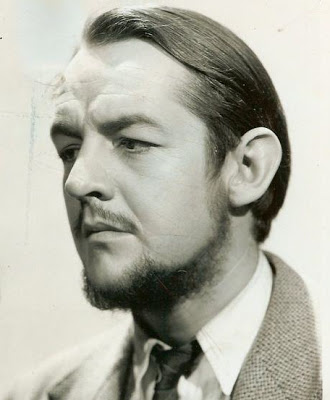
He proceeds to torture the Tin Man with the calculation of pi! The Tin Man cannot take it! Who could? Igor is none too subtle but subtle enough to mislead Handsome, Prof, and Daughter. While they are otherwise occupied, Igor hopes to extract technological secrets from the Tin Man to make a fortune. It does not occur to Igor that the Tin Man might have an agenda. He does.
Tin Man subdues Igor with his mind ray and the plot thickens. Tinny also grasps the daughter and zombies any number of locals who all work on his diving bell in the gloaming, which seems twenty-four hours a day.
By now Handsome has convinced the local plod that all this is really happening and together they decide to tell the truth to the local citizens, such is their faith in rationality and discipline of the demos. Hysteria and blind panic ensue. So much for the community spirit and the democratic ethos.
This Island of Otranto is cutoff from outside help, as per the script. Handsome alone must overcome the odds. He does.
What is interesting is the intention of the Tin Man. Was he always intent on enslaving the locals. despite the kindly assistance Handsome and Prof lent him at the first? Or did Igor’s clumsy mathematical abuse rile Tin Man up to retaliate? Or were Tin Man’s intentions always malevolent but tactically concealed at the first while sussing things out?
In the B sci-fi genre of the time this ambiguity is unusual. Stopping to think is usually not the objective of the B film maker.
Equally out of the ordinary is the daughter who has a cool head, a steely determination, and a sense of humour. She is not the stock celluloid woman of the time, weak, flighty, hysterical, uninformed, and the target for sexist remarks. If she looks familiar in the dark, she should, being Margaret Field, the mother of ‘Norma Rae.’
Igor is played by Mr Pomfritt, a stalwart of B movies, especially science fiction, with more than 370 credits on the IMDB. Yes, Mortimer, it is the ever reliable William Schallert whose laconic and sanguine guidance of Dobie Gillis lives on.
‘Hangar 18’ (1980)
The hypothesis of this feature film is intriguing. What should a reasonable person in authority do with a bona fide flying saucer?
 Much bigger inside than outside is this Tardis.
Much bigger inside than outside is this Tardis.
The Air Force just happens to have a base nearby and in the middle of the night a the airmen dig it out and uses a crane to put it on a truck taking it to the eponymous hangar, a facility devoted to serving NASA space shuttles. Hush, hush, hardly, hardly. It is thus well equipped for such a call-out. So far, so convenient.
What had happened? A NASA space shuttle was deploying a satellite and the saucer appeared in a blur and hit the satellite just as it was released. Two of the shuttle astronauts saw it all and have the telemetry to prove it. Ah huh.
NASA in the person of Darren McGavin, who breathes purpose, intelligence, and energy into his role, wants to know what happened, since nothing untoward appeared on the ground instruments.

‘Flight to Mars’ (1951)
This is a B picture par excellence. According to those who say they know, it was rushed out in fifteen days to get into the market ahead of George Pal’s bigger budget, aspiring A picture. ‘Destination Moon’ on which I comment elsewhere on this blog. There was a buzz of anticipation for this latter film and the effort here was to ride on that free publicity.
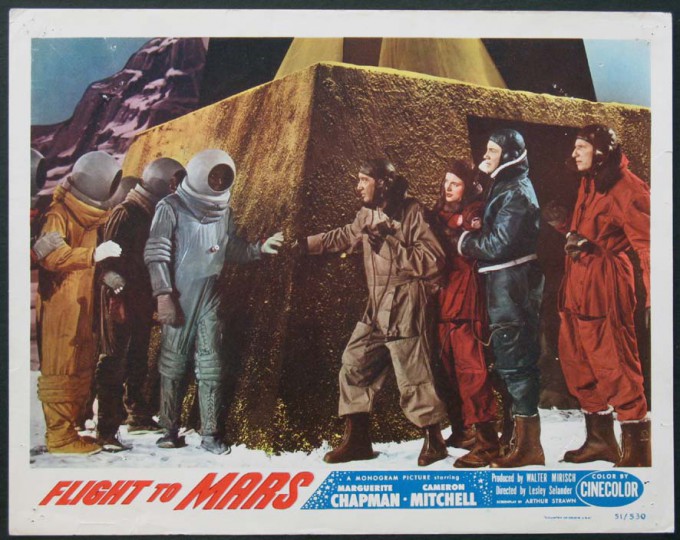 Spot the Martians in this lobby poster.
Spot the Martians in this lobby poster.
It is a melodrama in which the science is displaced by the fiction from the start. The science of space flight is an E-Z boy recliner with some grimaces on takeoff. These intrepid spacemen head for the Moon, and then take a hard right for Mars. So that is how solar navigation works. Please note that the top dog of the mission smokes his pipe while flying the M. A. R. S. to Mars. The mission is called M. A. R. S. for reasons that escaped me. (A lot did because I watched a poor quality print with skips in it and Portuguese subtitles. It’s what I could get at the time.)
 The latest launch gear.
The latest launch gear.
Why they want to go to M. A. R. S. did not get through to me. Perhaps. because it is T.H.E.R.E.!
They make a hard landing on Mars, though even that seems odd because the Red Planet (in every other sci-fi movie) is white with snow. No idea why. Yes, it is the North Pole of Mars. Maybe it was too dangerous in 1951 to have anything to do with Reds even on Mars. Did I mention science? They emerge from their battered craft in bomber jackets with surgical face masks for the Martian environment shod in war surplus boots soon to be sent to Korea. Oh boy. This seems to have been a come-as-you-are space flight.
That gets even stranger when they encounter the Martians who wear proper-looking and very familiar space suits. (These were borrowed from the Pal production, as were most of the other props.) Let’s get this straight. The aliens from distant Earth are wearing jackets and the local Martians are in spacesuits. Figure that one out.
To spice it all up this crew includes a journalist who is brazen, loud, nosy, and affable. There is also ‘a lady scientist.’ Cringe. Her presence, first in the crew, and later on Mars occasions some truly embarrassing dialogue for which the author was paid. For a start the journalist cannot fathom that a woman could be a scientist, and if by some anomaly in the universe she is, then she is no longer a woman. He makes sure to tell her this a couple of times. This man has charm, and knows it. It gets worse.
She is spared overt sexual harassment by the silent production code of 1950s films, but there is a love quadrangle later that I found as confusing as the participants did.
The crew also includes some geriatrics who were passed fit for bomber jackets. They wax philosophical at times.
On snowy Mars they encounter those real(er) space suits encasing Martians who welcome them with a handshake and a hot meal. Everything seems to be hunky dory. The Martian chief in a red cape to make Zorro envious is that sci-fi stalwart Morris Ankrum, who should have a star on Hollywood boulevard for the most aliens played.
 Martian fashion.
Martian fashion.
The Martian men DO NOT wear flared trousers, so we have something for which to be grateful. But they do sport fey little cloches for hats.
The ingenuity that went into these costume appurtenances has sapped the Martians of the technical capacity to build two-way radios or spaceships. While they can receive everything broadcast on Earth (in English – what will they make of ‘Gilligan’s Island’?) they cannot transmit. Still less can they build spaceships. What losers!
Warning! Here comes the melodrama. The fossil fuel Martians need for their underground cities (why are there so many moles in sci-fi?) is running out. They had their own Tony Abbot telling them that re-newable energy was unnecessary. Now what, Tony? Morris hatches a desperate and dastardly plan to let the Earthlings complete repairs, and make the ship spaceworthy, then top them, and replicate the ship into an armada to invade Earth, conquer it, and take over a habitable world. He thinks big for his KPI. No wonder he is top dog. See ‘Invaders from Mars’ (1953) where the stalwart Morris, now an Earthling, is to be found with some others from this cast dealing with the consequences of that scheme. What goes around, comes around, Morris.
For those who doubt Tony Abbott’s Martian duel citizenship, take a close look at those ears.
The naive Earthlings press on, but then get a tip off; plot and counter-plot is played out in a static set. B-o-r-i-n-g.
Walter Mirisch produced this lemon, but lived it down to become a big-time Hollywood mogul. He moguled on into his Nineties.
